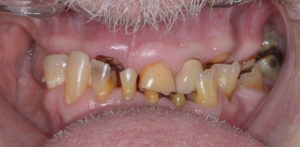According to the American College of Prosthodontists, 120 million people in the United States are missing at least one tooth. Of this number, more than 36 million do not have any teeth. Tooth loss happens for a number of reasons, including as a result of gum disease, tooth decay, injury, wear, and cancer.
The vast majority (90%) of people who suffer from edentulism (people who have no remaining teeth) have full dentures. While dentures are a popular option, they do come with a number of drawbacks. That is why more and more people are choosing to have full-mouth dental implants.
However, given that gum disease is a cause of tooth loss, some people seeking dental implants may suffer from this health condition. In this blog post, we will look at whether or not people with gum disease can get full-mouth dental implants. We will also highlight treatment steps for gum disease and what the ideal candidate for dental implants looks like.
Can I Get Dental Implants With Gum Disease?
Yes, it is possible to have full-mouth dental implants immediately placed. Periodontal disease does not affect a person’s ability to get dental implants. This is possible because our team works to remove all of the infected tissue and bad teeth in one single visit, leaving healthy gums and bone to facilitate the implants.
In order to ensure that the dental implant surgery is a success, it is beneficial to first undergo treatment for gum disease before moving forward. Many people aren’t aware that they have gum disease, which is why it is necessary to undergo a full oral health evaluation and professional cleaning when beginning the process of getting dental implants.
Understanding Gum Disease
Gum disease, also known as periodontitis, is a serious gum infection that damages the soft tissue and bone in the mouth. Without effective and timely treatment, periodontitis can destroy the bone that supports the teeth in their correct place. As we have highlighted above, periodontitis may result in tooth loss as the natural teeth can loosen.
It is caused by bacteria that accumulate on the gums and teeth. As the infection progresses, the teeth and bones become damaged. The good news is that the damage can be stopped if treated early and by following proper oral hygiene, brushing your teeth, and regular dental cleanings with a dentist or dental hygienist. If you are missing teeth due to severe damage or tooth loss, dental implants in Rockville can be a great solution to restore your smile and oral function.
The Different Stages of Gum Disease
Let’s highlight some of the different stages of periodontitis.
Inflammation
This early stage is known as gingivitis. One early sign of gingivitis is bleeding gums while flossing or brushing. Some discoloration may also be visible on the teeth, known as plaque, and is a buildup of food debris and bacteria on the teeth.
Early Periodontal Disease
During the early stages of periodontitis, a person may notice their gum start to recede from their teeth, with small pockets forming between the teeth and gums. These pockets may be home to harmful bacteria.
A common symptom is bleeding while flossing and brushing. During this stage, people may also experience bone loss.
Moderate Periodontal Disease
If periodontitis is not treated an allowed to progress, people with this condition may experience pain and bleeding around the teeth in addition to gum recession. As the teeth begin to lose bone support, they may become loose.
A person may also experience an inflammatory response throughout the body as a result of the infection.
Advanced Periodontal Disease
In the advanced stage of this disease, the connective tissue holding teeth in place will begin to deteriorate, which destroys the bones, gum, and tissue that supports the teeth. A common occurrence in this stage is tooth loss, along with pain while chewing and bad breath.
Understanding the Symptoms of Gum Disease
As we have noted above, there are a number of different symptoms of gum disease, depending on the particular stage of the infection a person is at. The main symptoms are:
Tooth loss
Receding gums
Bleeding gums
Pain when chewing
Foul taste in the mouth
Severe bad breath
Swollen and tender gums
Plaque buildup on the teeth
Changes in the position of teeth
Inflammatory response throughout your body
If you notice any of these symptoms, it is important to see a dentist. If you are planning to get full-mouth dental implants, you should seek effective treatment for gum disease first.
Treatment for Gum Disease 
There are a number of treatment options for gum disease. Usually, a combination of treatments is required to fully tackle the infection, while surgery may also be required in some cases. Let’s highlight some common treatment options here.
Scaling and Root Planing
As the name suggests, there are two elements to this deep cleaning treatment. Firstly, a dentist performs a scaling that removes plaque and tartar both below and above the gum line.
The root planing serves to smoothen out the teeth roots, helping to reattach the gums to the teeth. Depending on the severity of the gum disease, this process may take a number of dental appointments.
Antibiotics
Two common types of antibiotics that are prescribed to treat gum disease are tetracycline and penicillin. These antibiotics work to kill the bacteria that cause gum disease and come in the form of liquids, pills, or as an ointment applied directly to the gums.
Depending on the severity of the infection, these antibiotics may be taken for a few weeks or months, and may be taken in conjunction with another treatment method.
Gum Flap Surgery
Also known as gingival flap procedure, it is a surgical option that allows access to the tooth root in order to clean it. Local anesthesia is used to numb the gums before this procedure, ensuring the patient is comfortable at all times.
By carefully lifting the gum tissue, the dentist exposes the tooth root so that it can be cleaned. Any damaged bone tissue is also removed during this step. The tissue is then repositioned and sutured into place.
Gum Graft
A gum graft is a procedure designed to correct gum recession, one of the common symptoms of gum disease and a cause of tooth loss. This procedure involves taking tissue from elsewhere in the mouth and then transplanting it onto an area of recession. This is done using a growth matrix.
The newly-placed tissue provides coverage for the exposed tooth root. In some cases, rather than using natural tissue, artificial tissue may be used (this depends on the severity of the gum recession).
Understanding Dental Implants
In the case of dental implants, a full-mouth dental implant is a great option for people who need many teeth replaced. This procedure is also known as an “all-on-four implant” or an “all-on-six implant”, depending on how many implants per full arch.
In both cases, a person can choose to have an implant denture (a removable denture that snaps into the implants) or a fixed bridge (screwed or cemented into place).
All of our full mouth implant cases receive temporary teeth that will simulate the final set of teeth.
Who Are the Best Candidates for Full-Mouth Dental Implants?
Above, we highlighted how a patient with gum disease is an ideal candidate for full-mouth dental implants and should first undergo treatment for their gum disease. Now, let’s highlight the characteristics of the ideal candidate for dental implants.
Healthy Gums and Teeth
One important characteristic of the ideal dental implant candidate is that they have gums and teeth that are pretty healthy. They should ideally also go to the dentist regularly, both for routine checkups and cleanings.
The ideal candidate is missing between one and three teeth due to gum disease or tooth decay. While patients with severe gum disease are still candidates for dental implants, provided they first undergo proper treatment, some people with severe bone loss are not good candidates (snap-on dentures are a good alternative in this case).
Sufficient Bone Density
Plenty of bone density is required in order to be a good candidate for full-mouth dental implants. We perform dental X-rays to ensure that the patient has adequate bone density. In some cases, bone grafting may be required if the patient does not have sufficient bone density.
Other Important Factors
When it comes to the ideal candidate for full-mouth dental implants, there are a number of other factors to consider. For example, a person should not have untreated diabetes or autoimmune disorders. In such cases, the success rate drops substantially.
The ideal patient should also not be a heavy smoker, should be happy to commit to a four-month process, and should never have taken bisphosphonate drugs. If you are unsure about whether or not you are a strong candidate, don’t hesitate to schedule an appointment with our team.
Or learn more about the full mouth dental implants cost.
The Bottom Line: Full-Mouth Dental Implants and Gum Disease
The bottom line is that patients with severe gum disease are still good candidates for full-mouth dental implants. However, it is necessary that the remaining teeth are thoroughly cleaned and treated before the actual process of getting dental implants begins.
Here in Rockville, Maryland, your premier choice for dental implants is Rockville Dental Arts. We are proud to be recognized as the top-rated local dentist near you. Click here to schedule an appointment and learn more about our dental implant procedures.



